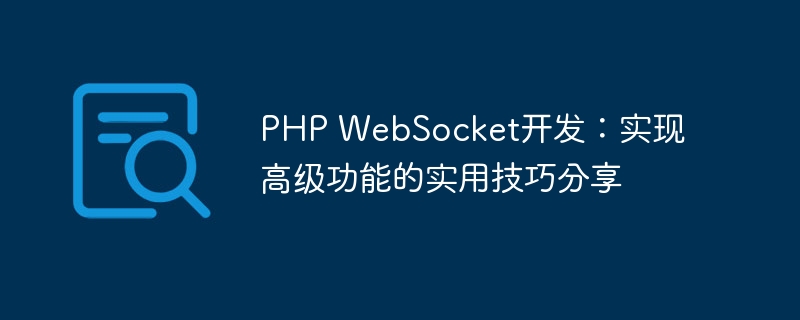Home >Backend Development >PHP Tutorial >PHP WebSocket Development: Sharing of Practical Tips for Implementing Advanced Functions
PHP WebSocket Development: Sharing of Practical Tips for Implementing Advanced Functions
- WBOYWBOYWBOYWBOYWBOYWBOYWBOYWBOYWBOYWBOYWBOYWBOYWBOriginal
- 2023-09-11 09:45:521373browse

PHP WebSocket Development: Sharing of Practical Tips for Implementing Advanced Functions
Introduction:
With the rapid development of the Internet, real-time communication in many Web applications are becoming increasingly important. Although the traditional HTTP protocol works well in the request and response mode, it has certain limitations in real-time performance. In order to solve this problem, the WebSocket protocol came into being. WebSocket is a full-duplex protocol that enables real-time communication between the server and client. In PHP development, we can use WebSocket to implement more advanced functions, and we will share some practical skills in this article.
- Choose the appropriate WebSocket library
In PHP, there are many open source libraries to choose from to implement WebSocket functions. Some of the commonly used libraries include Ratchet, Swoole, and ReactPHP. These libraries provide simple and easy-to-use interfaces and have excellent performance. Choosing the right library is very important for realizing advanced functions. You can choose the right library for development according to your own needs and projects.
- Using message queue
In some real-time applications, the amount of message interaction may be very large. In order to improve the performance and efficiency of message processing, message queues can be used for asynchronous processing. Store the received messages in the message queue and then use other consumers to process them. This can reduce the burden on the server and improve the concurrent processing capability of the system.
- Realize multi-room chat
In some chat applications, users may enter different chat rooms to communicate. In order to realize the multi-room chat function, you can use the broadcast function of WebSocket. When a user sends a message in a room, the message is sent to all users in the room, thereby enabling real-time multi-person chat.
- Implementing the online user list
In some applications, it is necessary to implement the online user list function so that other users can learn about the currently online users at any time. In order to achieve this function, you can use WebSocket's connection manager to store the user's connection information. When users connect or disconnect, update the connection manager's information and get a list of online users from it if needed.
- Maintain the stability of the connection
In WebSocket development, it is very important to maintain the stability of the connection. If the connection is unstable, it may cause problems such as lost or delayed messages. In order to maintain the stability of the connection, you can use the heartbeat mechanism to send heartbeat packets regularly to detect the status of the connection. If the connection times out or an exception occurs, you can reconnect in time or perform corresponding processing to maintain the stability of the connection.
Summary:
In this article, we share some practical tips to help developers better implement the advanced functions of PHP WebSocket. By choosing the right libraries, using message queues, implementing multi-room chat, implementing online user lists, and maintaining connection stability, we can build more powerful and efficient real-time communication applications. The development of WebSocket technology provides more possibilities for Web applications. I hope this article will be helpful to you in PHP WebSocket development.
The above is the detailed content of PHP WebSocket Development: Sharing of Practical Tips for Implementing Advanced Functions. For more information, please follow other related articles on the PHP Chinese website!

